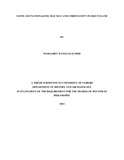| dc.description.abstract | This study examines the nexus between faith and nationalism against the backdrop of the Mau
Mau during the colonial period in Kenya. It argues that at the outset of the colonial rule,
missionaries, in close association with colonial administrators became the primary agents in the
advancement of European hegemony. In its vanguard role at cultural transformation, Christianity
became the face of the new order, as missionaries moved with alacrity to package the faith as
part of a superior alternative to the existing culture. This not only left for a perilously thin line
between the Gospel message and the advocacy of western values, but also saw Christianity
become a tool of colonial domination. The study, therefore, suggests that Christianity, by
enjoining itself to the colonial endeavour, precipitated a coexistence that laid bare the paradoxes,
and at times, contradictions, between the tenets of the Christian faith, and the ethos of colonial
rule.
Moreover, the study argues that the perceived cohabitation between Christianity and temporal
rule, the Bible and the Flag, coupled with cultural offensive deemed critical to actuating the new
order, opened several fronts of conflict between the colonizers and the colonized. The study
identifies these conflicts as having given form to the core issues that gave rise to, and influenced,
the trajectories that African nationalism, including that of the Mau Mau, assumed. Yet, this study
recognizes, and demonstrates, that Christianity, and the western values offered therein, were at
the same time the most important influences in raising African elite that used their new skills to
challenge colonial domination. In so doing, Christianity became a double-edged sword, which
for this study, mirrors the duality and competing interests that characterizes faith and
nationalism.
Further, the study, by centring the Kikuyu Christian community, historically considered an
important part of the loyalist class, affirms the importance of the loyalist phenomenon to the
understanding of the Mau Mau. Moreover, it posits that loyalism before, and during the Mau
Mau, was a complex phenomenon that defies simplistic classification. The revolt had implicitly
issued a challenge that required Christians to face up to their dual, and potentially, contradictory
positions as subscribers to a faith intrinsically tied to colonial domination, and to the values of
the colonizer. Yet Christians, like the rest of the colonial subjects, had suffered grave injustices.
This study, therefore, views the rebellion as an affront not just to the values and assumptions of
the colonial state and its ally, the Christian Church, but also an interrogation of the commitment
of the colonized to regaining their God-given right to freedom.
Finally, the study endeavours to demonstrate that the varied reactions by members of the Kikuyu
Christian community towards the Mau Mau affirms that at one level, there was no simplistic
polar division between anti-colonial nationalists and colonial collaborators. Conversely, the
factors that drove loyalism were arguably, as varied as its composition. Thus, to be a loyalist did
not necessarily mean taking sides with the government for clearly, there were other loyalties. The
study, therefore, holds the view that branding Christians loyalists, without interrogating the
factors that informed that loyalism, if such it was, is an injustice. Additionally, the study holds
that the ambiguities and the paradoxes arising from the amorphous nature of loyalism were
significant variables to the internecine nature that the revolt assumed.
All told, the study found that faith and nationalism are not virtues cast in black and white, but
rather that they exhibit multiple shades. In colonial Kenya, this nexus was a subtle and multicoded
phenomenon that harboured within it competing interests and multiple positions, while
raising important questions. Overall, this study incontrovertibly affirms that in Mau Mau’s
military “defeat” lay the blueprint for expanded political space for the colonised, and an impetus
towards an African leadership in the church and state. It recommends that given the advanced
age of the actors of the events at the centre of this study, scholars need to urgently redress the
still muted history of loyalists in colonial Kenya.
This study was guided by two complementary theories- namely, the Modernization Theory,
which is primarily a theory of social change, and the theory of Antidialogical Action, whose
central characteristic is cultural invasion and its aftermath. The integrated use of the two theories
underwrites the argument that in colonial Kenya, cultural invasion was the primary tool of social
change with missionary Christianity playing a central role.
The research methodology adopted is qualitative and comprises three components; use of extant
literature, archival data and oral interviews. Given the period and nature of the study, a purposive
sampling method was used to identify informants. This was based on several criteria: age range,
religious affiliation, geographical location, and role during the Mau Mau. Using the snowballing
method, qualitative data was collected from individual informants and to a lesser extent, through
focused group discussions | en_US |

